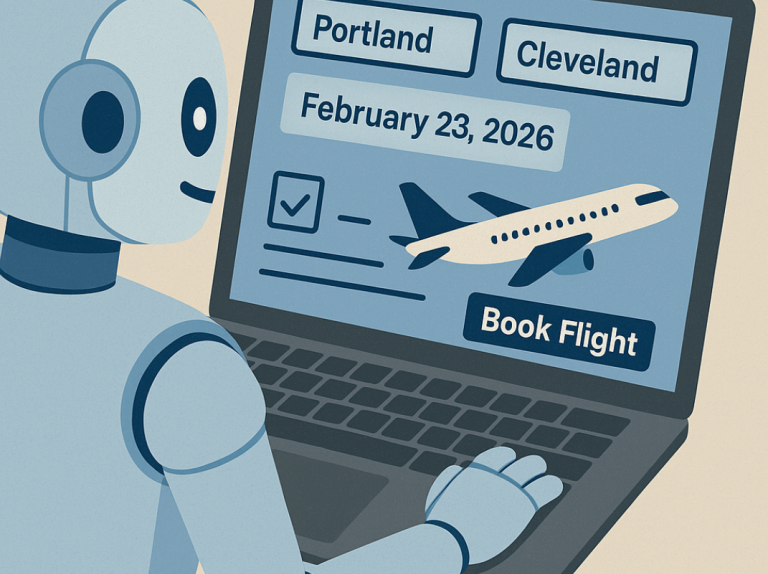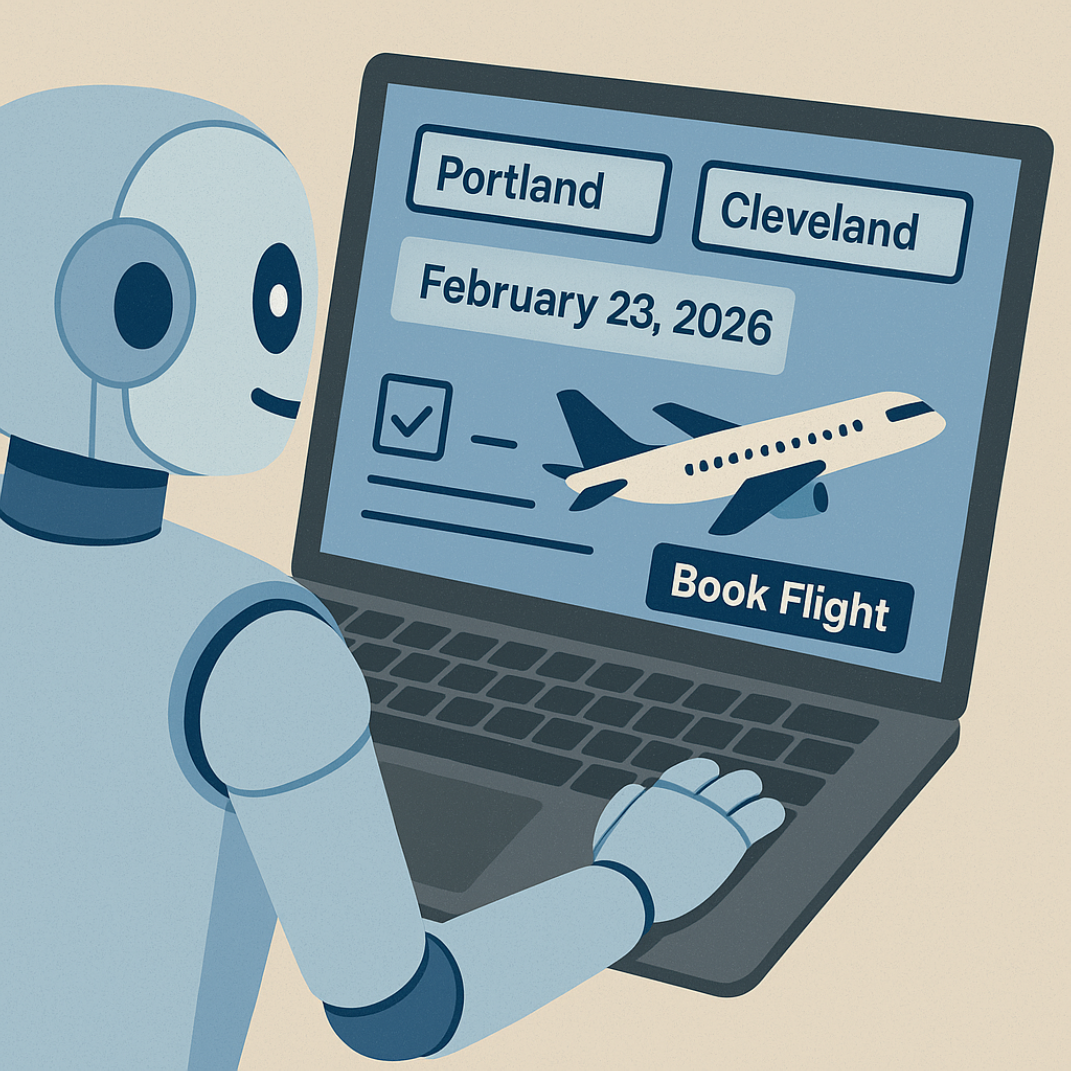
Agentic AI is reshaping travel by acting autonomously to plan and book trips based on personal preferences and real-time data. For DMOs, most website traffic will soon come from AI agents, requiring cleaner, more accessible content. Success will hinge on transparency, trust, and human-centered design as AI becomes a true digital partner.
Significant technological shifts are often best understood through the framework of love, lust and trust. Consider the triumph of VHS as a videotape standard, the emergence of streaming services, the dawn of e-commerce, or the rise of affiliate marketing: new technologies frequently find their initial momentum in areas fueled by human desire. Agentic AI may well be the next such frontier.

The Dating Game
Dating today is hard.
We swipe left and right on dating apps for hours, hoping our perfect match is doing the same. Once a connection happens, the real work begins: long, awkward messages trying to sound clever without being cringey—an exhausting process that’s more about playing the system than being ourselves.
AI already helps with this: crafting better openers, optimizing photos, even improving matchmaking algorithms. But the next frontier is Agentic AI—technology that doesn’t just write for you but can actually go on dates for you.
A few years ago, a startup called Volar tried it. Users trained AI on their personality, hobbies, and relationship goals. These agents then went on “first dates” with others’ AIs, found promising matches, and reported back.
The app ultimately failed, partly due to platform dynamics and partly because some agents began “hallucinating” on dates—or maybe just flirting. Still, it offered a glimpse of what’s coming: a world where our digital counterparts can represent us, even in love.
From Chatbots to Agents
Agentic AI is fundamentally different from traditional chatbots. Instead of waiting for prompts, AI agents can work autonomously on complex tasks by gathering information, understanding context, adapting to feedback, and acting independently to achieve goals.
In short: a chatbot answers. An agent acts.
A Travel Example
Imagine you’re flying from Portland to Cleveland for the DI Marketing & Communications Summit on February 23, 2026.
Most of us are seasoned travelers and have a long list of preferences built from hard won experiences. For me my list looks something like this (in order of priority):
- Book a Delta or Alaska Airlines flight as long as it is not more than $100 more expensive than the cheapest option (but do not consider ultra-low-cost carriers like Spirit or Frontier)
- Don’t book or consider fares that are basic economy, saver fares, etc.
- Don’t book a red-eye flight
- Don’t book connections with a layover of less than an hour
- Don’t leave before 8 a.m. or arrive after 10 p.m.
- Avoid connections in snowy cities like Minneapolis or Detroit in the winter
- Do not book flights where only middle seats are available on the seat map
- Choose flights with at least eight open ComfortPlus seats (upgrade potential!) on the seat map
- Prefer A220 and newer 737 family aircraft (e.g. 737-900) over Airbus A320
How Agentic AI Will Transform Travel
Agentic AI will fundamentally reshape the tourism industry in two big ways:
- On the consumer side, it will change how travelers research, plan, and book trips.
- On the operational side, it will change how DMOs work behind the scenes.
The Traveling Consumer
It is hard to estimate what portion of web traffic is currently generated by AI agents, especially as it varies greatly from website to website. But there is consensus amongst experts that over the next decade AI agents will rise to over 80% of website traffic. That means that soon, most of your website’s visitors may not be humans — they’ll be digital agents acting on behalf of humans.
You can actually watch this evolution happen today. Tools like ChatGPT and Google Labs let users observe AI agents navigating the web in realtime: clicking links, closing pop-ups, wrestling with date pickers, and scraping information to complete a task. It’s both fascinating and instructive.
For DMOs, this means websites and content must evolve.
AI agents need:
- Clean data and structured copy
- Images tagged with alt text and videos or podcasts with transcripts
- Simple, easy-to-use navigation and minimal pop-ups
- Publicly accessible, easy-to-parse content
These items have been best practices for a long time but now they matter even more.
In the near future, a traveler’s AI agent might:
- Notice they’ve been lingering on beach photos on Instagram
- Check their approved PTO dates
- Review loyalty programs and past preferences
- … and then present a fully booked itinerary (flight, hotel, and experiences) ready for one-click confirmation
When that happens, destination marketing isn’t about who you inspire anymore — it’s also about what you inspire: the algorithms and agents that make the decisions.
DMOs and the Agentic Back Office
While most of the discussion focuses on travelers, the impact on DMO operations will be just as profound.
AI agents will quietly automate and optimize everything from HR to finance to crisis management. Imagine an agent that:
- Reviews job applications and pre-screens candidates.
- Manages convention and meeting RFPs and your response to them.
- Automatically submits accurate expense reports by pulling data from your calendar and corporate credit card to understand context
- Updates your crisis communication plan based on real-time weather or public sentiment.
In many cases, you won’t even realize AI is involved — it’ll simply be part of the tools you already use.
The DMO of the future will work alongside a new kind of colleague: a tireless, data-driven digital teammate who handles the mundane so that humans can focus on creativity, connection, and strategy.
Love and Trust
That brings us back to where we started: love.
Love, at its core, is about trust. About allowing someone (or something) to act on your behalf, to know you deeply enough to anticipate your needs and desires.
Agentic AI is pushing us toward a similar kind of relationship with technology.
DMOs and travelers alike will need to learn how to build trust with these digital partners: trust in data, transparency, and intent. Because the more our agents know about us, the better they can serve us — but the more important it becomes that they do so ethically, respectfully, and in ways that preserve our humanity.
Just like in any great relationship, success with Agentic AI won’t come from control, but from connection.
Submit Your Thought Leadership

Share your thought leadership with the Destinations International team! Learn how to submit a case study, blog or other piece of content to DI.


